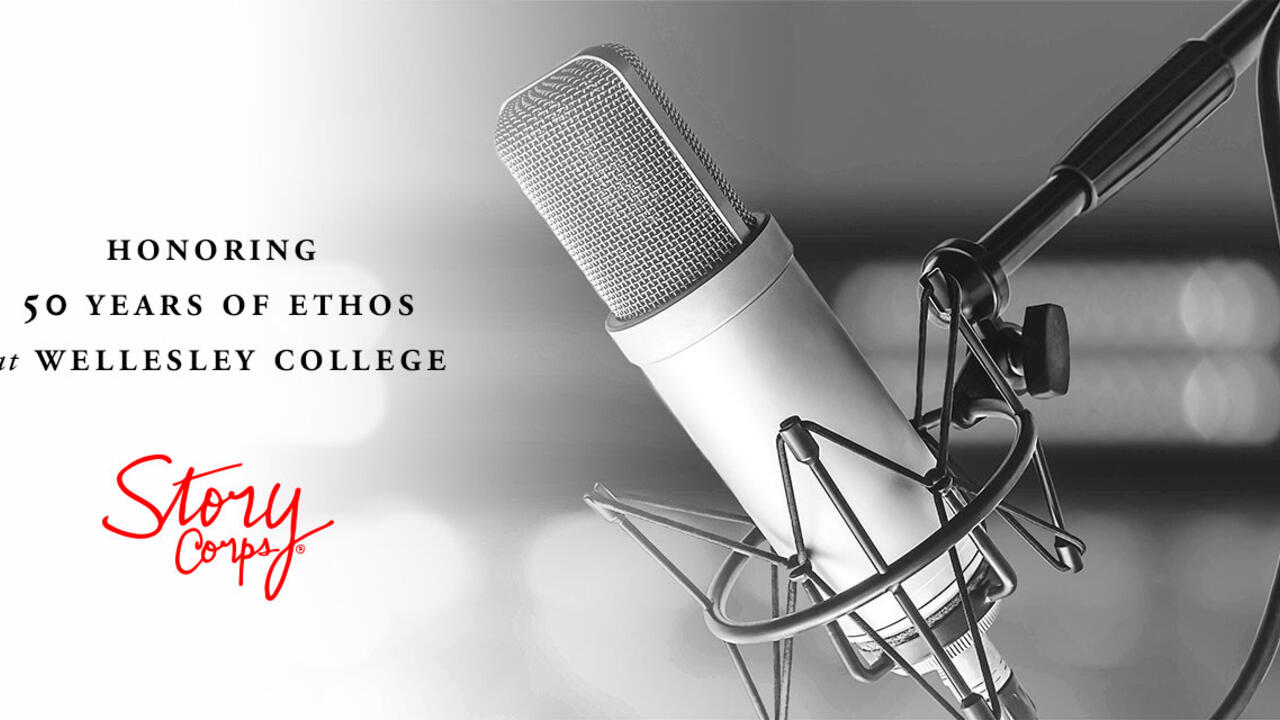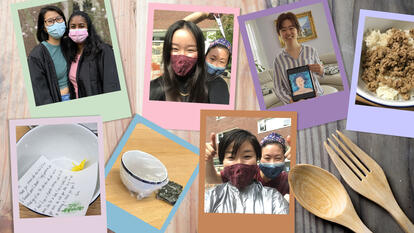Wellesley Women of Color Pay Tribute to Ethos’ 50th Anniversary in StoryCorps Podcast

During Ethos’ 50th anniversary celebrations last spring, alumnae representing the five decades of Ethos’ history came together to reflect upon their experiences as women of color at Wellesley. Part of the College’s StoryCorps podcast series, a newly released podcast captures conversations from the event between fellow classmates and good friends. Each offers a snapshot of the organization at a particular moment in time, illuminating the central concerns of the day. Together, they form an oral history of an evolving Wellesley, from the founding of Ethos in 1968 to the 2010s.
Below are excerpts from three of those conversations. You can listen to the full podcast here.
Recalling Ethos’ early days, Wellesley Trustee Emerita Karen Williamson ’69, an Ethos founder, health care executive, and nonprofit leader, and current Wellesley Trustee JudyAnn Bigby ’73, a physician and educator, discussed the organization’s initial struggles and successes, particularly in challenging the College’s administration to diversify admissions.
“To be able to go from five students in [Williamson’s] class to 57 students in my class is quite remarkable, and shows the commitment the College made because of the pressure from a small number of students,” said Bigby.
“When we started, you didn’t think, ‘In 50 years, people are going to be so glad you did this.’ We reacted to a problem, and we worked together, we made some things happen, and it continued through the leadership of those who have come after us,” said Williamson.
Classmates Pamela “Pamm” McNeil ’82 and Tracy Heather Strain ’82 shared their early encounters with race on campus, and discussed how Ethos and Harambee House made class, social, and geographical “crossings” possible, fostering unexpectedly diverse and enriching friendships.
Strain, a filmmaker who was raised to “do her own thing,” independent of race, recalled her initial confusion about and eventual embrace of the Ethos community: “Are they saying, ‘You need to be here because this is where the black people are,’ as opposed to thinking, ‘This is a place where you can draw support because these are people who have had similar experiences’? …Growing up, I didn’t have a community of black friends. It wasn’t until I got to Wellesley that I had a really close black female friend.”
McNeil, a nonprofit, education, and legal administrator, reflected, “When I got to Wellesley, the black women here…were from all kinds of backgrounds. There were really wealthy black women, and there were women from inner city, really rough situations, and I was raised in the middle. But here was a place where we all came together. There was a wealth of life experience and talent and all of the things that make Wellesley what [it] is, but within it, there was this microcosm of black women.”
Close friends Liz Miranda ’02 and Natalie Gill-Mensah ’03 discussed Miranda’s personal and professional journey, from being a young woman raised by a teenage mother, searching for her next steps, to gaining the confidence to make a difference in the world and run for public office.
“When I got on campus…I was this 17 year-old girl from Roxbury, really rough around the edges… I remember my 17th birthday meaning so much because my mom got pregnant at 17 and dropped out of school…There was a sense that 02119 was this ZIP code, and that my life expectancy and my possibilities were determined by that,” recalled Miranda. “When I was at Wellesley, every day I saw banners and signs that said, ‘We are women who will make a difference in the world.’ One of the things I thought about was, ‘How do I go back home and create a new narrative for girls who look like me?’”
Miranda, who was recently elected state representative of the 5th Suffolk District in Boston, added, “I came to Wellesley not sure what was possible, but I left knowing that nothing was impossible.”
Malika Jeffries-El ’96, Shelly Davis ’97, and Katrina Mitchell ’96 discussed the evolution of Ethos’ objectives from advocating for diversity and inclusion on campus to thinking about the broader aspects of being black women in the world. Journalists Diamond Sharp ’11 and Ikhlas Saleem ’11 talked about the effects of social media on social movements, the silence around class differences, and learning to code switch between different social groups at Wellesley, a skill that has contributed to their professional success.
“The Ethos podcast preserves and pays tribute to an important part of Wellesley history: the stories of Wellesley women of color,” said President Paula A. Johnson. “For over 50 years, Ethos members have worked hard and with great resolve to advance diversity, inclusion, and equity on campus, providing at the same time a framework for student activism and leadership that has benefited not just students of African descent but the entire Wellesley community.”
Tracey Cameron, assistant dean of intercultural education, advisor to students of African descent, and director of Harambee House, said, “These stories are a record not only of Wellesley’s effect on students and alumnae, but of the tremendous impact students and alumnae can have on Wellesley for generations to come. They demonstrate that academic and personal success is animated by inclusive excellence, by all students feeling empowered, valued, and challenged.”
About StoryCorps and Its Partnership with Wellesley
StoryCorps’ mission is to preserve and share humanity’s stories in order to build connections between people and create a more just and compassionate world. Founded in 2003, its current CEO is Robin Sparkman ’91. In 2015, StoryCorps partnered with Wellesley to create a lasting record of the stories of Wellesley women across generations; they have become a part of the national archive at the Library of Congress as well as part of the Wellesley College Archive. Previous podcasts have included conversations about the power of a liberal arts education, how Wellesley students go on to lead in any and every field, the lifelong friendships that fuel the alumnae network, and what it means to be part of a transformative force in the lives of women around the globe.



